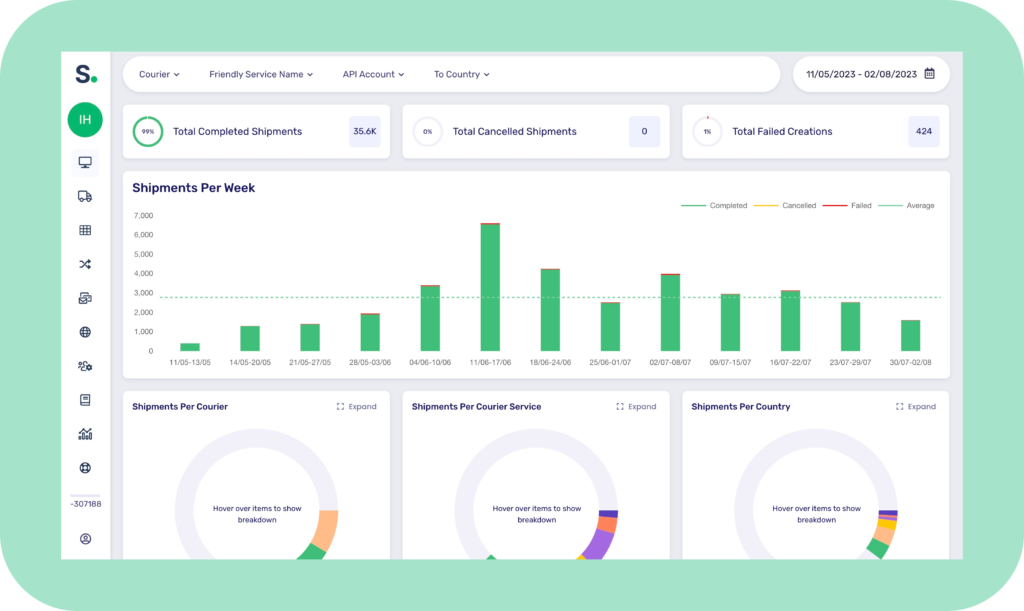Table of Contents
Looking for ways to reduce shipping costs? Ever felt like you’re on a mission to cut costs, but your bottom line keeps playing tug-of-war? It’s a challenge many in eCommerce understand. After product costs, shipping is the second-biggest expense for many online retailers, requiring a delicate balance to offer competitive rates while covering your own costs.
If any of this sounds familiar, you’re in the right place! In this blog, we’ll explore the challenges of how to reduce shipping costs, share actionable tips, and highlight Despatch Cloud as a game-changing shipping solution. Let’s dive in!
Understanding Shipping Costs
Shipping expenses extend beyond the cost of a postage stamp; they cover a range of elements integral to eCommerce shipping.
- Postage Fees: As the bedrock of shipping costs, postage fees are the charges levied by carriers, which are calculated based on package weight, size, and destination, influencing shipping rates.
- Packaging Materials: The selection of boxes, bubble wrap, and tape is crucial in shipping, as efficient packaging options not only safeguard the product but also play a significant role in managing shipping costs.
- Shipping Zones: The cost of eCommerce shipping is affected by the distance a package travels, with shipping zones dictating the variance in expenses for longer journeys.
- Carrier Selection: Choosing the right carrier is pivotal in shipping, as different carrier selections can lead to substantial savings, depending on their specific pricing models and the service levels required by your business and customers.
- Delivery Speed: In the realm of shipping, the quest for rapid delivery speed can incur additional costs. Opting for expedited or express shipping options typically means higher expenses compared to the more economical standard delivery.
- Tracking and Insurance: Essential shipping services like tracking shipments and offering shipping insurance enhance customer confidence but also introduce an extra layer of cost. These features, while providing peace of mind, contribute to the overall shipping expense.
- Customs and Duties: When it comes to shipping across borders, understanding the complexities of customs and duties is essential. These additional charges are pivotal factors in the accurate calculation of international shipping costs.
- Fuel Surcharges: In the ever-changing landscape of eCommerce shipping, fuel surcharges are a variable cost, influenced by the volatility of fuel prices. These surcharges are applied by carriers and have a direct effect on shipping costs.
- Returns Handling: In eCommerce shipping, the process doesn’t conclude with the initial delivery. Incorporating the costs of returns handling is vital, as it represents an additional aspect of the overall shipping expenses.
The influence of shipping costs on profitability is significant, shaping pricing strategies, enhancing customer satisfaction, and determining the competitive edge of a business. A strategic shipping strategy requires balancing customer expectations with the imperative of a healthy bottom line.
5 Ways to Reduce Shipping Costs
Explore effective strategies to cut down on shipping expenses and enhance your eCommerce profitability.
1. Negotiating With Shipping Carriers
Negotiating with shipping carriers is a crucial strategy for eCommerce businesses aiming to curtail shipping costs. By forging strong partnerships with carriers, businesses can secure customized pricing structures, volume discounts, and potentially more advantageous terms.
Begin your eCommerce shipping strategy by delving into shipping data to uncover trends and bargaining leverage. Equip yourself with insights on your shipping volume, destination zones, and service requirements when approaching carriers. Utilize the competitive environment, as carriers often compete for lucrative high-volume partnerships.
Despatch Cloud stands out as an eCommerce shipping solution by offering a fully integrated platform for centralized shipping operations and comprehensive visibility. It provides real-time updates on order status and courier performance, equipping businesses with actionable insights and user-friendly analytical dashboards for enhanced, data-driven decisions.
2. Utilising Packaging That Fits the Product Size More Accurately
By tailoring your packaging materials to align closely with product dimensions, businesses can not only improve item protection during transit but also reduce wasted space and materials, which has a direct effect on lowering eCommerce shipping costs.
3. Bulk Shipping
Businesses can leverage bulk shipping to capitalise on economies of scale, which leads to reduced shipping costs per unit. This strategy not only cuts down on individual shipping expenses but also boosts efficiency in the fulfilment process, allowing for better rate negotiations with carriers, volume discounts, and a more streamlined packing and labelling workflow.
4. Carrier Diversification
In the ever-evolving realm of eCommerce, diversifying carrier partnerships is crucial to securing optimal shipping rates. Sole reliance on a single carrier can restrict flexibility and leave businesses vulnerable to service and pricing volatility. By engaging with multiple carriers, businesses can compare and negotiate rates, ensuring they secure the most advantageous shipping deals tailored to their specific needs.
Furthermore, leveraging multiple carriers in eCommerce shipping enhances operational resilience against disruptions, mitigating risks tied to carrier-specific issues such as delays or capacity constraints. The strategic employment of a variety of carriers not only promotes cost efficiency but also enables businesses to offer a diverse range of shipping options to customers, boosting satisfaction and market competitiveness.
Despatch Cloud facilitates this process as an eCommerce shipping solution, offering easy courier integration with 120+ global couriers through a fully self-service platform. This empowers users to effortlessly expand their courier network and fine-tune their courier mix to optimally meet the unique shipping demands of their business.
5. Considering Hybrid Shipping Services
Hybrid services adeptly merge the rapidity of express carriers with the cost-effectiveness of standard shipping, making them a cornerstone of eCommerce shipping strategies. By judiciously employing a blend of carriers and hybrid services based on elements like delivery urgency and destination, businesses can fine-tune their shipping expenditures for maximum efficiency.
This method affords flexibility in selecting the most suitable shipping method for each unique order, upholding cost efficiency while ensuring punctual eCommerce shipping. Through the adoption and integration of hybrid shipping solutions, companies can achieve a harmonious balance between cost savings and customer contentment, carving out a competitive advantage in the bustling eCommerce marketplace.
How to leverage technology for Better Shipping Rates
In the highly competitive eCommerce market, leveraging cutting-edge technology is the key to unlocking new efficiencies and reducing shipping costs.
One significant aspect is the incorporation of advanced eCommerce management systems like Despatch Cloud. These platforms streamline the entire order fulfilment process, from order placement to shipping, providing real-time visibility and full control over your operations.
Additionally, embracing data analytics and artificial intelligence (AI) can revolutionize how businesses approach shipping logistics. Predictive analytics can forecast shipping demands, allowing for better planning and resource allocation. AI algorithms optimize shipping routes, suggesting the most cost-effective paths and carriers.
By harnessing the power of technology, businesses not only enhance operational efficiency but also gain valuable insights that contribute to more informed decision-making, ultimately leading to significant reductions in shipping costs.
Reducing Costs and Improve Efficiency when Shipping International.
Navigating the complex world of international shipping demands a strategic approach to balance cost-effectiveness with maintaining high service quality. This ensures that global deliveries are both affordable and reliable.
To minimize shipping costs, businesses should focus on packaging optimization, aligning with the dimensional weight pricing model to reduce wasted space. This is a crucial step for cost-effective ecommerce shipping.
Leveraging regional carriers and consolidators can offer significant advantages in eCommerce shipping, as they often provide competitive rates for international deliveries, making them a smart choice for businesses looking to expand their reach.
By negotiating volume discounts with international carriers, businesses can achieve substantial cost savings in ecommerce shipping, highlighting the importance of cultivating strong partnerships for long-term success.
In the realm of ecommerce shipping, employing cutting-edge technology like address validation tools is essential to avoid costly address correction fees and guarantee precise delivery to customers.
Businesses should also prioritize customs compliance in their ecommerce shipping strategy and embrace automation to simplify customs documentation processes, thereby avoiding delays and potential fines.
A diverse carrier portfolio and a deep understanding of international shipping regulations are crucial for developing a cost-effective and efficient ecommerce shipping strategy that caters to the demands of global eCommerce operations.
How Despatch Cloud Supports eCommerce Shipping
With its forward-thinking approach, Despatch Cloud distinguishes itself as an all-encompassing eCommerce shipping solution that not only streamlines but also transforms the shipping landscape.
Despatch Cloud’s robust platform revolutionises eCommerce shipping by consolidating couriers and shipping processes in one place, empowering businesses with flexible courier options and end-to-end visibility of their operations.
Not only that. By unifying shipping operations, Despatch Cloud simplifies the management of multiple carrier relationships, empowering businesses to refine their international logistics strategies and boost cost-effectiveness.

Despatch Cloud’s address validation tool is a game-changer in eCommerce shipping, improving accuracy and significantly diminishing failed or late deliveries due to typos or incomplete address information.
The platform also simplifies international shipping by automating customs documentation, ensuring adherence to regulations to reduce possible delays or incurring fines.
Ultimately, Despatch Cloud transcends being a mere shipping solution; it’s a transformative tool that enables businesses to manage the intricacies of shipping for both substantial cost savings and heightened operational efficiency.
Conclusion
Navigating the complexities of shipping costs becomes more manageable with intelligent shipping management tools such as Despatch Cloud’s. From negotiating with carriers to embracing technological advancements, there are many strategies businesses can use to dramatically reduce expenses and fine-tune the logistics framework of a business.
Despatch Cloud offers cutting-edge ecommerce shipping solutions, enabling you to manage all your couriers and shipments in one place and automate customs documentation seamlessly.
By embracing innovative eCommerce shipping strategies and harnessing the capabilities of Despatch Cloud, you can set sail towards substantial shipping cost reduction and greater operational excellence — and a fantastic start to actually making a meaningful impact on reducing shipping costs for your business.
Try for free today
Expand your courier network and ship with ease with our shipment management software.

You might also like:

10 Shipment Tracking Email Examples 2024
In this blog, we’ll go over some of the best examples of shipment tracking emails to guide and inspire your post-purchase communications.